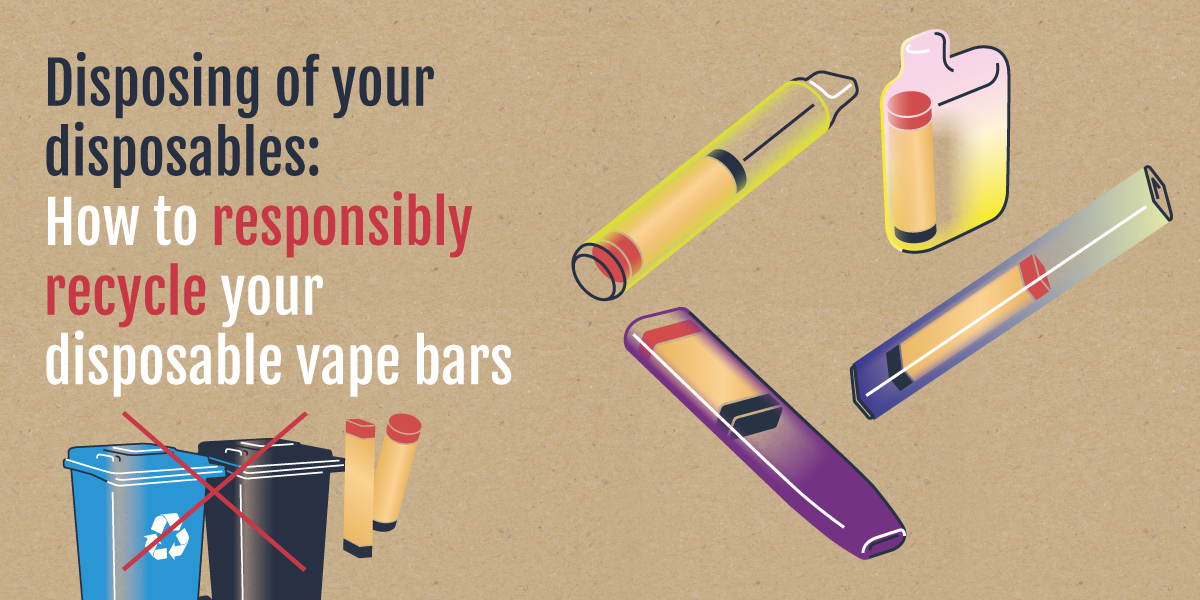
In the UK alone, we dispose of over 600 million batteries each year. With the stratospheric rise in popularity of disposable vapes, that number is set to rise further. So how can we balance the use of these amazing smoking cessation devices with protecting our precious planet?
The average disposable e-cig delivers around 500-600 puffs before you need to throw it away. That’s roughly the equivalent of a pack of cigarettes. If you’re only a social smoker, that might be enough to last you a few weekends. However, for the average smoker, that could mean that you’re getting through a disposable vape every couple of days.
This is all well and good if using one is helping you to stay off the ciggies; as we know, vaping is a far safer alternative to smoking.
However, what’s the potential impact on the health of our planet?
Disposable vape bars - a growing phenomenon explained in numbers
According to a new report from Future Market Insights, the global disposable vape market is expected to reach $6.34 billion by the end of 2022. By 2032 this number will hit $18.32 billion.
This is based on the latest compound annual growth rate (CAGR) which has risen rapidly to 11.2%, compared to 5.6% between 2017 and 2021.
This dizzying level of growth is bringing more and more products to the market. Most of the major vape industry players are launching disposable ranges in order to get a slice of this highly lucrative pie. Over the course of the last year, we’ve added roughly one new vape bar range to our offering every week!
To give you an idea of the volumes here in the UK, I’ve run the latest numbers…
At the time of writing this sentence, we’ve sold over 3.8 million disposable vape bars this year alone (from 01.01.22 to 12.09.22 at 12.03pm). That figure will have increased by another few thousand by the time I publish the article.
Granted, we’re one of the UK’s largest online vape retailers, so our numbers are always going to be high. However, consider that it’s not just online vape retailers that stock these devices. You can buy disposables at every supermarket, petrol station, and off-licence in the country.
Add it all up, and the number of single use vape bars bought in the UK in 2022 is estimated to reach 168 million!
Do disposable vapes endanger valuable resources?
If there are 168 million disposables purchased in 2022, then that equates to two being disposed of every second.
Granted, the battery in the average disposable vape contains only around a tenth of a gramme of lithium metal; but extrapolate by the numbers purchased and it soon becomes a worrying amount.
Discarded disposable vapes account for roughly 10 tonnes of valuable lithium being sent to landfill or incinerators every year - enough of the precious metal to make batteries for 1,200 electric cars.
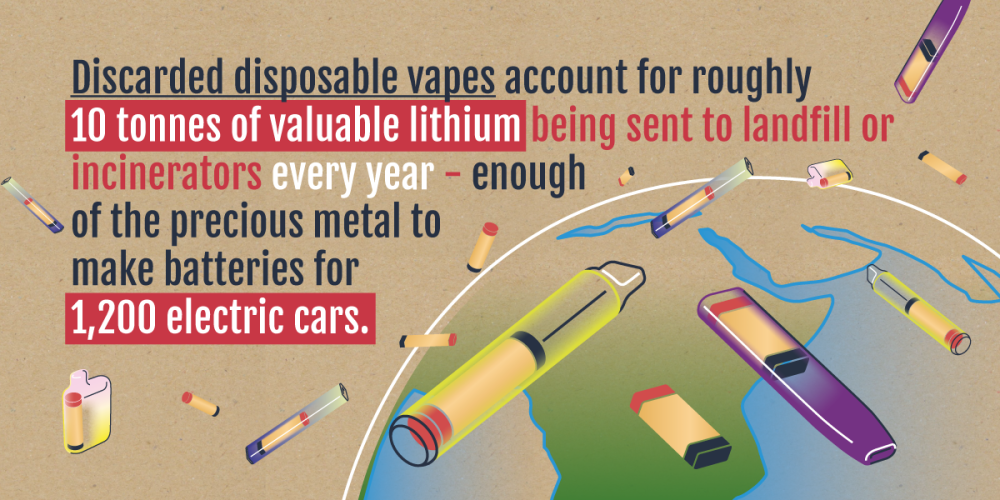
Lithium supplies are finite
In 2022, we're predicted to consume half a million metric tons of lithium globally; but by 2035, the demand for lithium is expected to increase to at least 3.7 million tons. If we're going to be using lithium at a rate of several million tons a year, we need to be thinking about recycling it rather than continually mining it, because lithium is not an infinite resource.
Plus, the manufacturing processes of lithium present significant environmental and health hazards in and of themselves. Mining the various metals needed for Li batteries requires vast resources.
It takes 500,000 gallons of water to mine one tonne of lithium. In Chile's Atacama Salt Flats, lithium mining has been linked to severe adverse impacts such as declining vegetation, hotter daytime temperatures, and increasing drought conditions in national reserve areas.
So, it’s incumbent on all of us to ensure as much of it can be recycled and reused as possible.
Depending on the recycling process employed, it is possible to recover up to 80% of the lithium contained in end-of-life batteries. Yet data from McKinsey & Company shows that the amount of lithium that currently comes from recycling is appallingly low, and is only predicted to reach 6% of the primary supply by 2030. This is a serious concern!
Are we recycling our batteries in the UK?
A survey conducted by Business Waste regarding overall battery disposal methods shows that 40% of Brits have never recycled their batteries, with many saying that it was because it was too much hassle.
Shockingly, a third of people admitted to throwing batteries into the bin, and 75% of them didn’t know about the environmental damage this could be causing.
A quarter of people surveyed didn’t know batteries could be recycled at all.
And these statistics show a similar trend when consumers of single use vapes are specifically asked about their disposal methods.
Just over half of users reported throwing their vapes in the household trash when they run out, rather than putting them in a waste electricals’ recycling bin; however, bear in mind that, according to a study from March 2021, 49.1% of people don’t actually know how to properly dispose of them.
How do disposable e-cigarettes impact the environment?
As well as the environmental impact of mining the materials required to create batteries in the first place, the ones that end their life in rubbish bins are taken to landfill sites. When batteries begin to rot away in landfill, harmful chemicals including lead, cadmium, zinc, mercury, and - of course - lithium can leak into the ground, which causes soil and water pollution. When these chemicals contaminate the soil and water, then animals, humans, and the environment are at risk of harm.
Horrifically, a significant proportion of this electronic waste is sent from the west to developing countries across Africa and Asia. This allows ‘rich countries’ to be seen to meet their waste management targets, while creating hazardous health and ecological conditions in the recipient country.
How should disposables be disposed of?
Every time you purchase a disposable vape, you’ll notice that the packaging shows a crossed-out wheelie bin.
This symbol on a vape kit (or any electrical device for that matter) means you MUST NOT throw the product in the general rubbish bin.
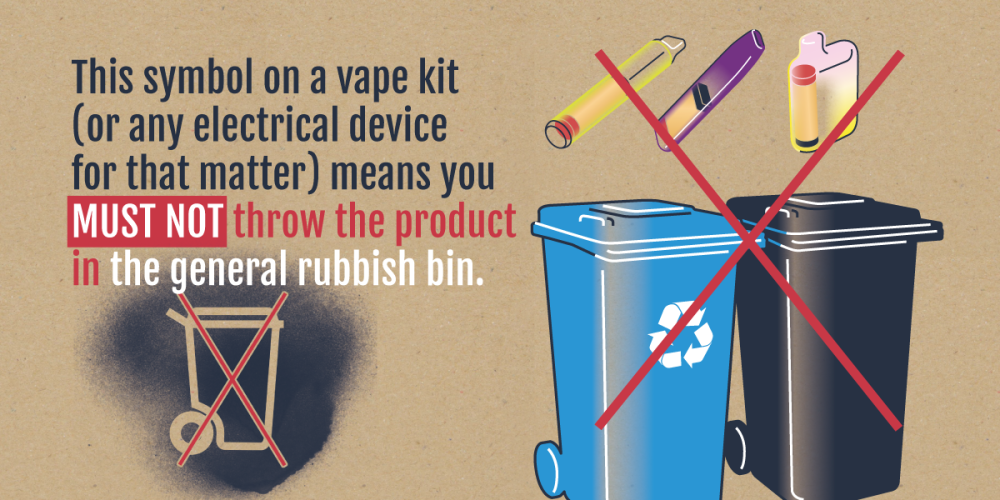
This isn’t just because of the environmental impact of batteries ending up in landfill, by the way. Batteries in the waste stream are a big cause of fire, resulting in millions of pounds’ worth of damage each year.
Instead, they should be disposed of using appropriate electrical recycling methods.
What are the options for appropriate electrical recycling?
Some local authorities across the UK (such as mine in Mid Sussex) offer dedicated kerbside collections. They supply an electrical recycling bag or bin to all households, and collect them just like they would any other kind of recycling.
This is by far the most convenient option for consumers, and the one most likely to increase the amount of electricals that are sent to recycling. However, not enough councils offer this service yet - something that Defra has been tasked with reviewing this year.
If that isn’t an option for you, then all Household Waste Recycling Centres have bins for electricals and batteries. Use this locator to find the one closest to you.
Finally, dedicated battery bins are located in most shops and supermarkets. You can even find electrical recycling bins in some car parks and designated roadside areas.
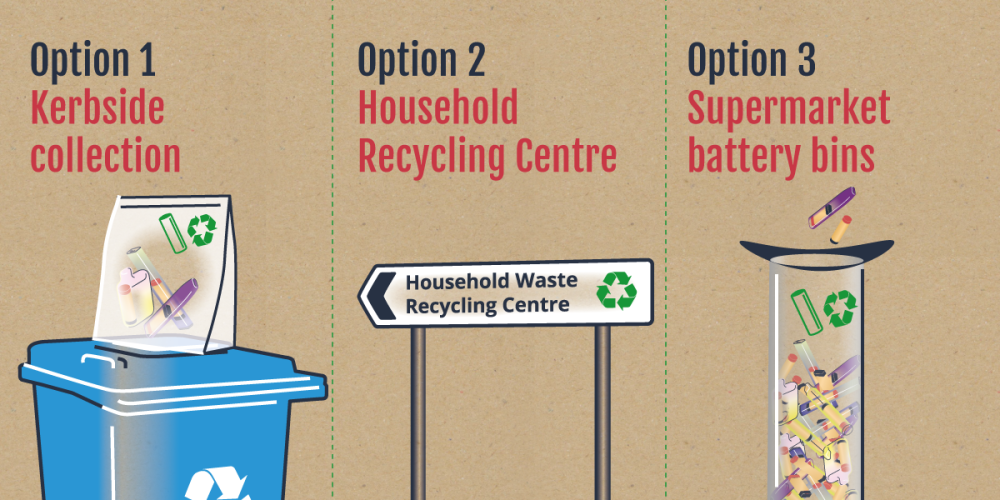
Whichever option is available to you, the end result should be the same. Your collected vapes will be taken to a dedicated recycling centre. Here, the built-in batteries are removed from casings, and the rest of the device is broken down by machine and by hand.
The fragments are sorted into different materials such as metals and plastics, and then cleaned. Material that can be collected is sent to specialists – plastics go for further processing and metals go to smelters, for example. All salvaged materials will be used to make something new.
What is Vape UK doing about recycling disposables?
Firstly, as full members of UKVIA (UK Vaping Industry Association), we add our expertise, knowledge, and support to the growing number of like minded vape retailers across the UK who seek to promote a smokefree future, without harming the environment.
We aim to educate, and lobby, primary stakeholders such as policy makers, parliamentarians, regulators, the public health community, and the 7m smokers across the UK, about the worrying effects of the disposables’ market on the health of our planet, and how we can mitigate the impact. A key focus right now is campaigning for improvements to accessibility for electrical recycling.
Secondly, we are working with the manufacturers of disposables, as well as key supply chain partners, to improve on the clarity around how these devices should be disposed of. Ideally, we’d also like them to provide a convenient method whereby disposables can be sent back to a central location for processing and repurposing.
Finally, we also offer a service where we properly and safely recycle single use vape bars on behalf of our customers.
If you live locally, you can drop them into us during opening hours. If you aren’t nearby, simply place 10 or more used kits into a jiffy/padded bag, and post them back to us at the following address:
Disposable Kit Recycling
Vape UK
Unit 2A Victoria Trading Estate
Victoria Road
Portslade
Brighton
BN41 1ZQ
What are the alternatives to disposable vapes?
We absolutely recognise the need for disposables to exist. They are proving to be extremely effective at getting smokers that may be sceptical about vaping to give it a go. That’s down to there being minimal initial monetary outlay, and no complexity to the device.
However, once you’ve decided that vaping is the way forward to keep you off the dreaded smokes, you really ought to be looking at switching up to a refillable/rechargeable device.
We’re not saying that rechargeable devices don’t impact the environment as well. They need to be responsibly recycled just like their disposable counterparts. However, with a bit of care, their substantial longevity in comparison is certainly more beneficial.
According to our sales data, the average rechargeable device lasts for eight months; compare this to the average disposable which lasts for just two days.
Refill to save money, as well as the planet
Plus, vaping with rechargeable products will not only be kinder to the environment, it will be kinder to your bank balance too. You may think that powering up rechargeable batteries will send your (already sky high) electric bill soaring through the roof; in fact, recharging them via mains charger is much cheaper than buying new disposables all the time.
Refillable starter kits are nowhere near as expensive as you might think, and ongoing spend on e-liquids and coils will be far more cost-effective in the long run. One 10ml bottle of premium e-liquid can be purchased from as little as £2, and gives you the equivalent volume of vape juice as five disposable kits, which would set you back £20!
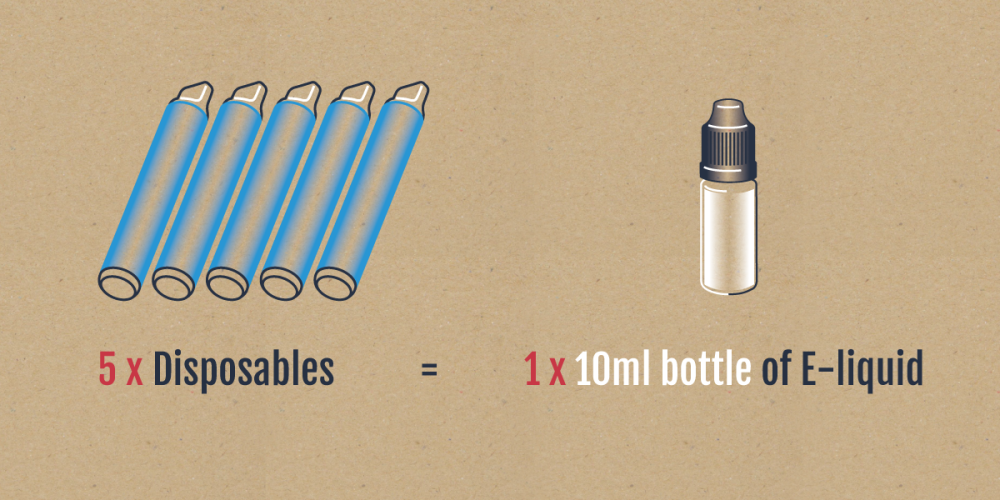
When it’s time to dispose of the disposables
Ultimately, these are disposable vape devices. They aren’t designed to last forever. Once the reservoir of e-liquid is empty, or the battery runs out of charge, it’s time for a new one.
Disposable vape bars are intended to replace the approximate number of puffs you would expect from a packet of cigarettes. If you intend to permanently replace your smoking habit with a safer vaping habit (which we hope you will), you’ll want to switch up to a refillable vape kit at some point. Not only is it going to be cheaper for you in the long run, it’s also far better for the health of the planet.
Of course, whatever vape you choose is completely down to you; we just ask that you please never throw anything containing a battery into general waste. We need to dispose of our disposables carefully to save valuable resources, minimise risk of fire, and avoid polluting our environment.
We're here to help you quit smoking for good
At Vape UK, we pride ourselves on being responsible vaping advocates. We keep up to date with all of the latest news and studies; we supply high quality TPD compliant vaping products; and we are always on hand to offer helpful and honest advice about vaping. Please get in touch if you have any questions about vaping for our team.


